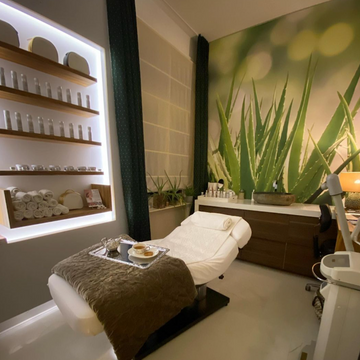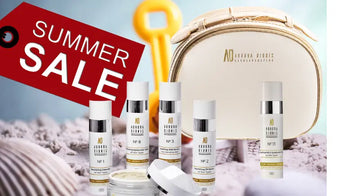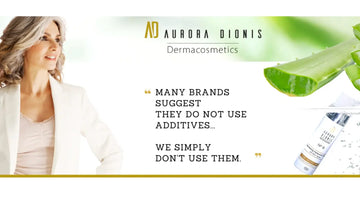Retinol Facts & Warnings, Safe & Gentle Use
Retinol is often presented as the solution for skin aging, even as the only truly effective anti-aging ingredient.
But is that the whole story?
At Aurora Dionis, we believe that skin improvement isn't about harsh chemicals, but about a healthy skin routine, nourishing ingredients, and gentleness, even for the most sensitive skin. Anti-aging without irritation.
Retinol is a frequently praised ingredient in the skincare world. But what exactly is it, how does it work, and what are the recommendations for safe use? In this blog post, we delve deeper into the facts about retinol and discuss the warnings from the Scientific Committee on Consumer Safety (SCCS) regarding the use of this popular ingredient.
What is the SCCS (Scientific Committee on Consumer Security)?
The SCCS is an independent committee (Scientific Committee on Consumer Safety) that advises the European Commission on the safety of cosmetic products and their ingredients. Their assessments are based on scientific research and data from various sources. In this case, they investigated the safety of vitamin A in the form of retinol, retinyl palmitate, and retinyl acetate.
What exactly is retinol?
Retinol is a form of vitamin A, an important vitamin for skin health. Vitamin A is essential for various bodily functions, including vision, growth, and immune function, but it also plays a significant role in skin care. When we talk about retinol in skin care products, we're usually referring to a specific form of vitamin A that helps renew skin cells and improve skin texture.
How does retinol work in the skin?
Retinol works by penetrating deep into the skin and binding to receptors in skin cells. This helps accelerate cell turnover and stimulate collagen production. Collagen is a protein that keeps skin firm and elastic. As we age, natural collagen production decreases, which can lead to wrinkles and sagging skin. Retinol helps counteract this process by stimulating the skin to produce more collagen.
What skin problems can retinol treat?
Retinol is used to treat various skin problems, including:
- Acne: Retinol helps keep pores clear and prevents clogged pores that can lead to acne.
- Wrinkles and fine lines: By stimulating collagen production, retinol helps make the skin smoother and firmer.
- Hyperpigmentation: Retinol can help reduce dark spots and discoloration of the skin.
- Irregular Skin Texture: It promotes skin exfoliation, resulting in smoother and more radiant skin.
Why is the safety of vitamin A a point of debate?
Vitamin A is essential for many bodily functions, but in high doses it can be toxic. The main concerns with long-term use of retinol and its derivatives in cosmetics are:
- Teratogenic effects: Risk of congenital abnormalities in pregnant women.
- Liver toxicity: Possible liver damage in case of excessive intake.
- Skin irritation: Local effects such as redness and flaking.
What does the SCCS say about safe concentrations?
The SCCS has established the following safe concentrations for the use of vitamin A in cosmetic products:
- Body lotions: Maximum 0.05% retinol.
- Hand creams, face creams and other leave-on or rinse-off products: Maximum 0.3% retinol.
Why these limits?
These concentrations were determined based on the total vitamin A exposure from all sources, including food and supplements. The SCCS has estimated that vitamin A exposure from cosmetic products at the concentrations mentioned above results in a daily systemic dose of 4855 IU (International Units) for an adult. This is within the safe limits established by the European Food Safety Authority (EFSA).
How much is 4855 IU?
- 4855 IU is a safe amount, according to experts. It's enough to get the skin benefits of retinol, such as fewer wrinkles and smoother skin, without having to worry about side effects.
- For comparison, a glass of milk contains about 500 IU of vitamin A. So 4855 IU is roughly equal to the amount of vitamin A in ten glasses of milk.
Specific risks and considerations
The SCCS has also taken into account vulnerable population groups, such as:
- Women with osteoporosis: For this group, a maximum intake of 1500 μg retinol equivalents per day (5000 IU) is recommended to minimize the risk of bone fractures.
- Children over 6 years: Although vitamin A and its esters are not used in products for children in the EU, a theoretical exposure scenario has been assessed.
What does this mean for your skin?
Vitamin A in the form of retinol and its esters (retinyl palmitate and retinyl acetate) is safe for use in cosmetic products within established concentration limits. However, it is important to consider the total intake of vitamin A from all sources to avoid toxicity.
How do you start using retinol?
If you're just starting to use retinol, it's important to start slowly to avoid skin irritation:
- Start slow: Start with a low concentration of retinol and use it only a few times a week.
- Build up gradually: Gradually increase the frequency and concentration as your skin becomes accustomed to it.
- Evening use: Retinol can make the skin more sensitive to the sun, so it is best to apply it in the evening.
- Protect your skin: Always use a sunscreen with a high SPF during the day to protect your skin from UV rays.
What are the precautions when using retinol?
Retinol is a powerful ingredient, but there are a few things to watch out for:
- Pregnancy: Retinoids are not recommended for pregnant women or women trying to conceive, as they may affect embryo development.
- Skin irritation: Retinol can cause skin irritation, especially at first. Start with a low concentration and gradually increase the dose to give your skin time to adjust.
- Sun Protection: Because retinol can make the skin more sensitive to the sun, it is essential to use a sunscreen during the day.
User Recommendations
- Use as directed: Always follow the recommendations on the product label.
- Protect your skin: Wear sunscreen during the day, as retinol can make your skin more sensitive to the sun.
- Consult a dermatologist: If you are pregnant, breastfeeding, or have skin concerns, consult a dermatologist before using products containing retinol.
- Caution in children: Do not use products containing vitamin A in young children unless specifically recommended by a doctor.
Future Research
Research into the safety and effectiveness of vitamin A in cosmetics is ongoing. New findings may lead to adjustments in recommended concentrations or instructions for use.
In summary, the SCCS confirms that retinol and its derivatives are safe for use in cosmetic products within established limits. By following these recommendations, you can enjoy the benefits of retinol without worrying about safety.
Aurora Dionis' view on skin aging:
Rather than relying on harsh agents like tretinoin or high concentrations of retinol, at Aurora Dionis we believe in the power of gentle yet effective ingredients such as niacinamide, hyaluronic acid, lactobacillus ferments and cold-pressed botanical oils.
These natural active ingredients support the recovery of the skin barrier and help gently to visibly slow down skin aging without irritation or redness.
True skin improvement doesn't come from just one active ingredient, but from balance, care, and a routine that suits you.
References
- Scientific Committee on Consumer Safety (SCCS), "Opinion on Vitamin A (Retinol, Retinyl Acetate, Retinyl Palmitate)," SCCS/1576/16, 20 April 2016, final version of 6 October 2016.
- European Food Safety Authority (EFSA), "Tolerable Upper Intake Levels for Vitamins and Minerals," 2006.
- Nutrition Center, "Vitamin A," accessed at Voedingscentrum.nl.
- A Clinician's Guide to Topical Retinoids
- NCBI Article
- ScienceDirect Article
- ResearchGate Publication





